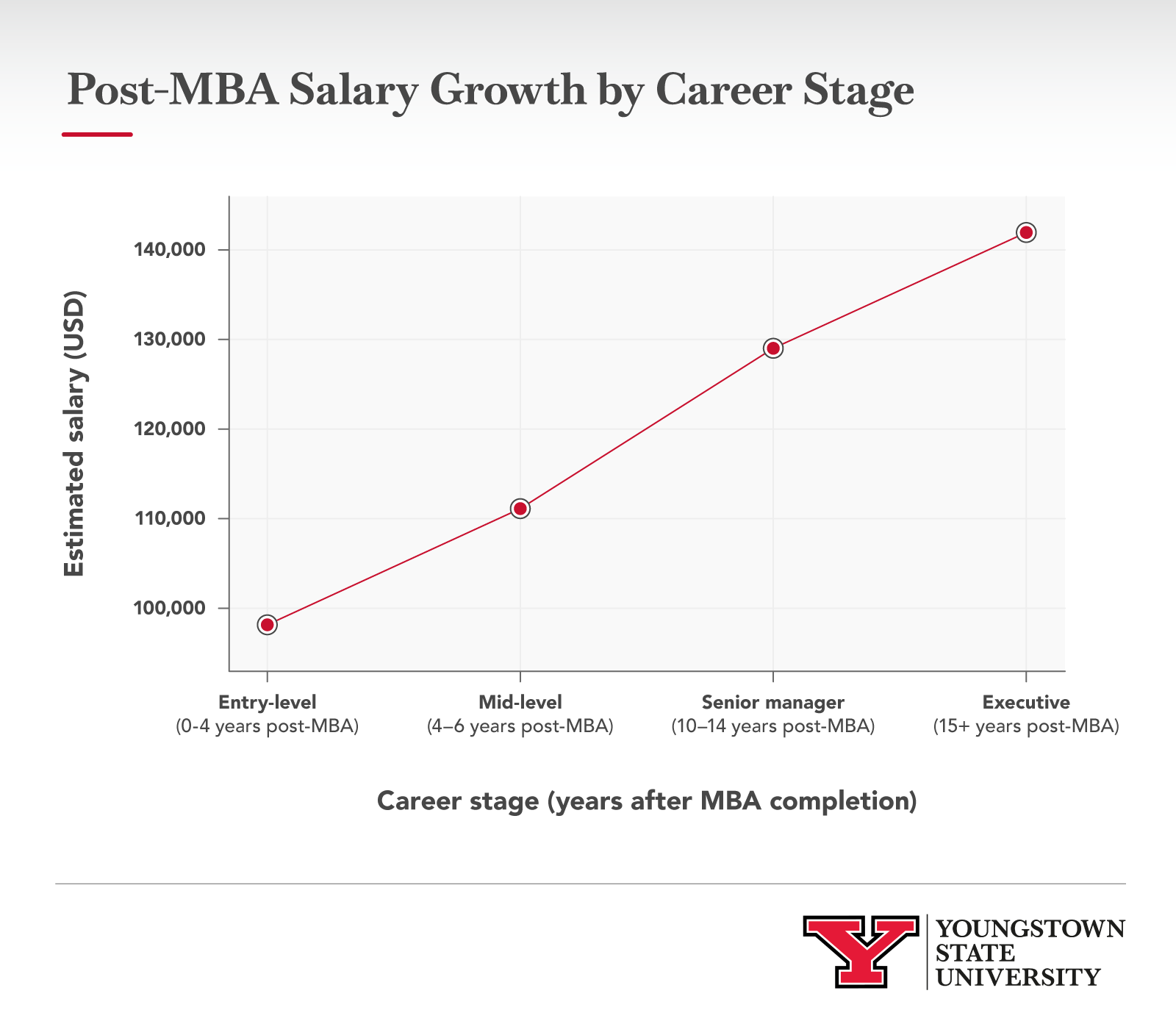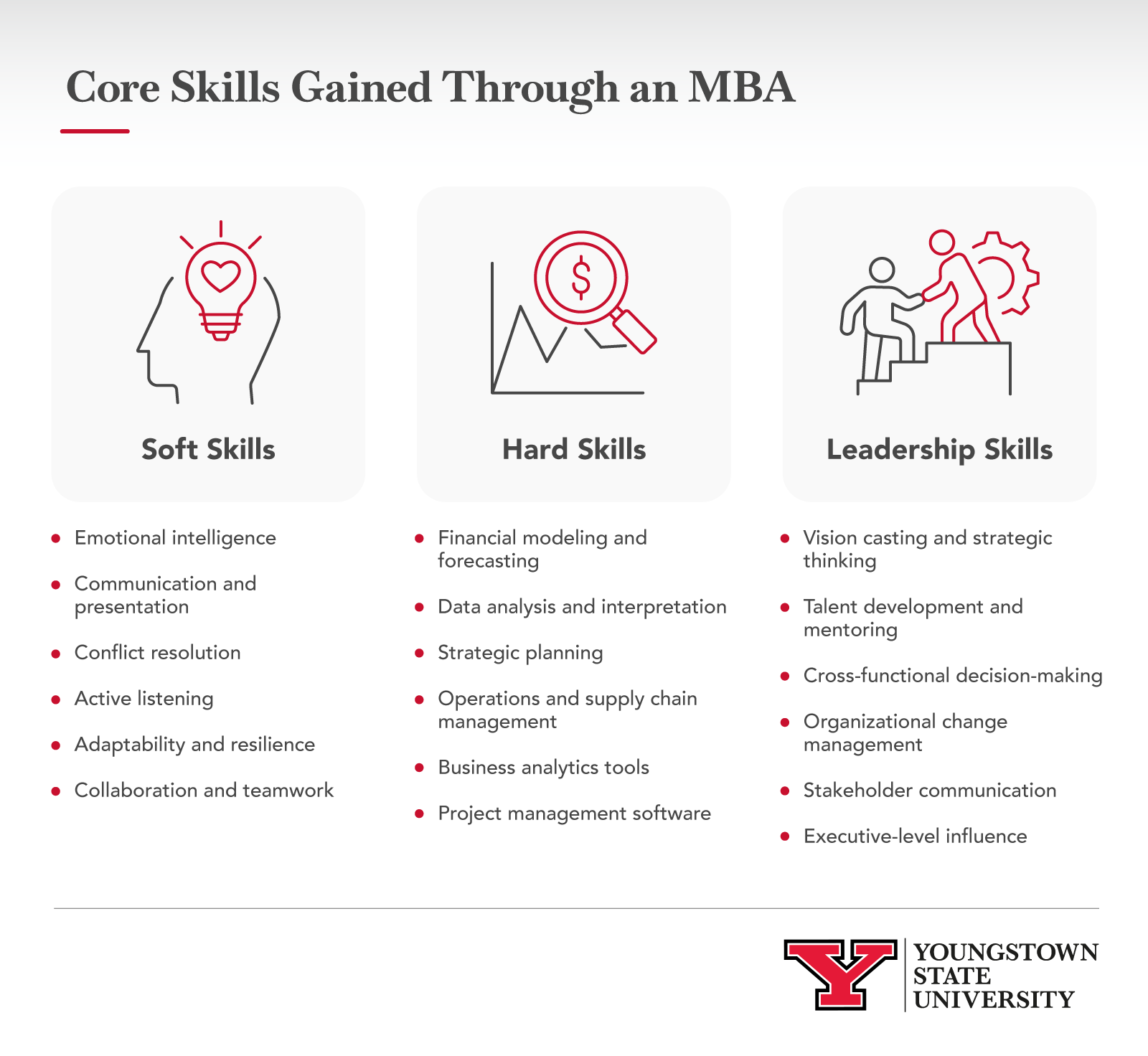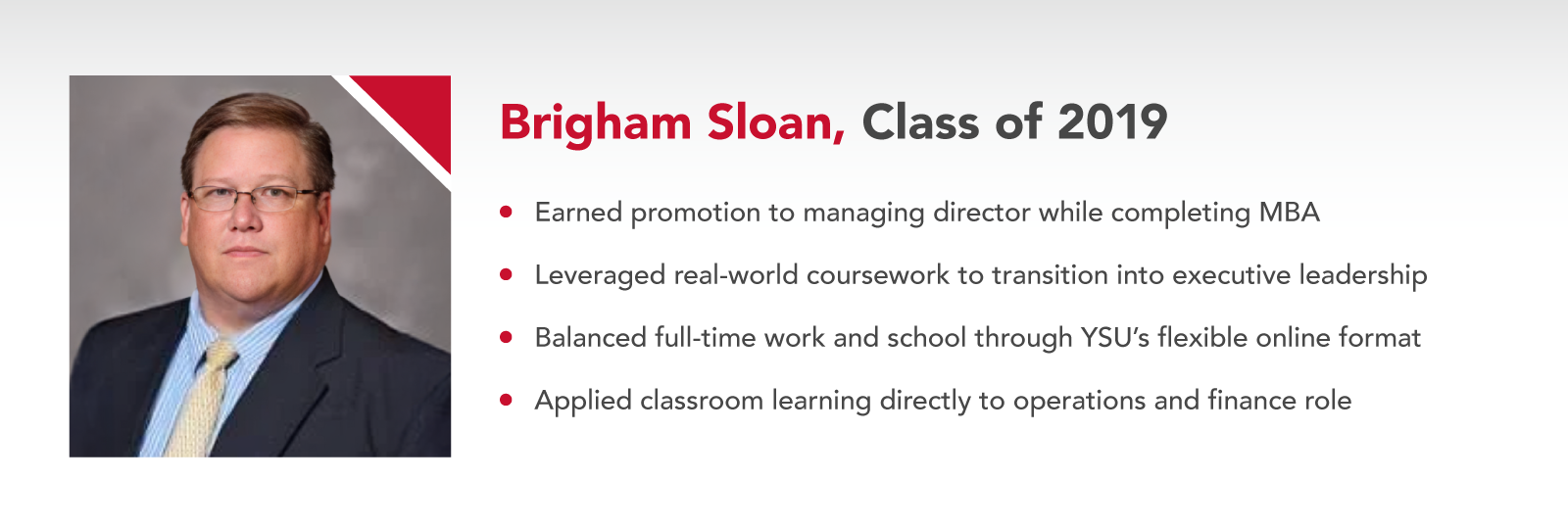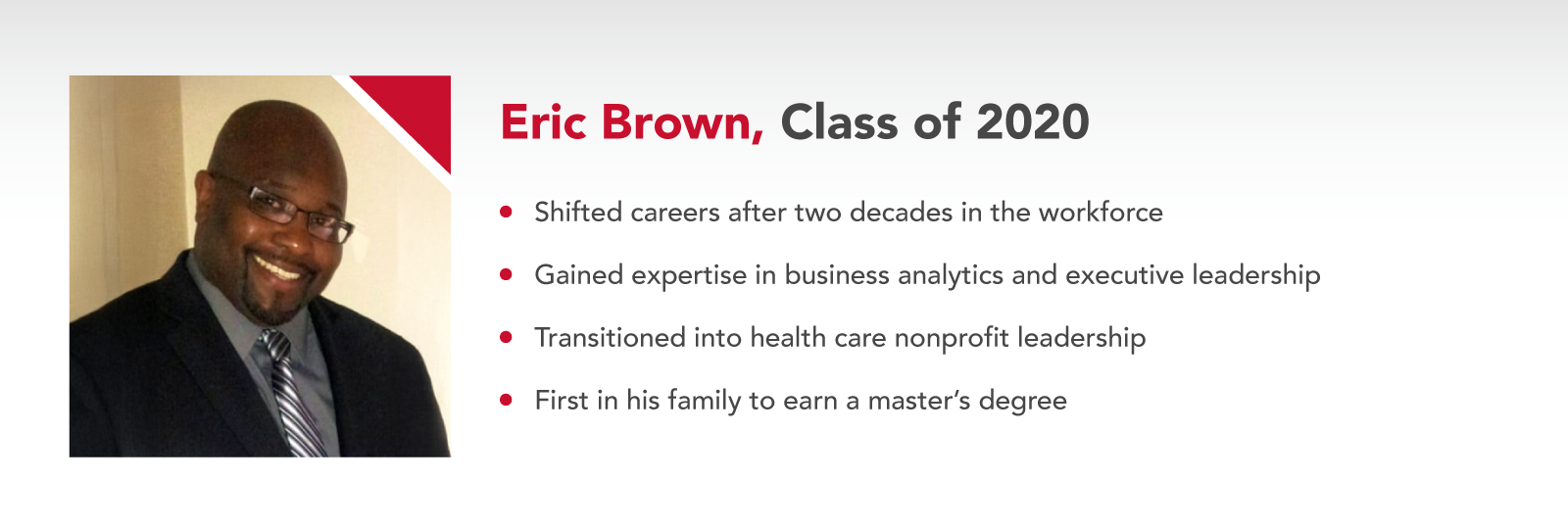
If you’re weighing the value of a Master of Business Administration (MBA) in today’s competitive job market, you’re not alone. Whether you’re eyeing leadership roles, shifting industries or leveling up your business knowledge, the benefits of an MBA degree go far beyond classroom theory. In 2025, professionals across industries are turning to the Master of Business Administration degree to accelerate their growth and increase their earning power.
Enrolling in an MBA program can sharpen your strategic thinking, expand your professional network and give you the confidence to lead, whether you’re advancing in your current field or charting a new career path altogether. With flexible formats like the online MBA programs from Youngstown State University (YSU), you can earn your MBA degree while keeping your current role and applying insights in real time.
And the financial payoff is clear: The average total pay for an MBA graduate is $128,997, per Investopedia — a strong indicator of ROI, and a compelling reason to consider how an MBA can reshape your career trajectory.
Unlocking New Career Opportunities
Pursuing an online MBA opens doors. Whether you’re a recent grad with a bachelor’s degree or a mid-career professional ready for a new challenge, earning an MBA signals to employers that you’re equipped for the next step. Many MBA graduates use the degree to pivot into entirely new industries or roles that once seemed out of reach.
You’re not just building academic credentials — you’re boosting your visibility and perceived value in the eyes of hiring managers. Here are some potential MBA-fueled career transitions to consider:
- Finance to consulting: Gain strategic thinking tools that make you competitive in advisory roles
- Engineer to product manager: Combine technical chops with business acumen for cross-functional leadership
- Health care or nonprofit to corporate roles: Translate service experience into executive influence
- Corporate role to owning your own business: Use your business knowledge to launch and run your own business successfully
An MBA helps reshape your career path, opens new job opportunities and better positions you in the dynamic job market.
Increasing Your Earning Potential
One of the clearest benefits of an MBA is its impact on salary, especially over time. Whether you’re early in your career or working toward higher-level leadership roles, this degree provides measurable financial upside.
Median salaries for MBA holders rise sharply within just a few years post-graduation. While exact figures vary by field, professionals with an MBA typically earn significantly more than those without, often by tens of thousands annually.
Here’s a general salary range by career stage after completing an MBA:
| Post-MBA career stage | Salary |
|---|---|
| Entry-level (0-4 years post-MBA) | $75,303 (base, per Investopedia) |
| Mid-level (4-6 years post-MBA) | $107,827 (average) |
| Senior manager (10-14 years post-MBA) | $123,525 (average) |
| Executive (15+ years post-MBA) | $132,000 (average) |
An MBA unlocks management positions in competitive sectors by showcasing your work experience, strategic thinking and readiness for higher-level responsibility. In today’s business world, employers view MBA grads as well-rounded candidates ready to lead, making the degree a strong return on investment for long-term earning potential and proving MBA worth again and again.

Building Leadership and Management Skills
An MBA is a training ground for leadership. The best programs are designed to shape you into a strategic thinker, confident communicator and effective team builder. Whether you’re managing projects or preparing for senior roles, MBA coursework strengthens both your management skills and your personal leadership style.
Modern curricula balance practical business skills with deep dives into decision-making, organizational behavior and project management. As you engage in group projects, presentations and case studies, you’ll refine your communication skills and learn how to influence outcomes in high-stakes environments.
Leadership skills are among the top reasons students pursue an MBA, which may explain why nearly 40% of Fortune 1000 C-suite executives hold an MBA. Here’s how MBA programs typically develop a well-rounded leadership toolkit, depending on the specialization:
- Hard skills: Students build technical and analytical capabilities through courses on topics such as financial modeling, forecasting, strategic planning, data interpretation, operations and supply chain management. They may also learn to use business analytics tools and project management software.
- Soft skills: These programs foster essential interpersonal traits like emotional intelligence, communication and presentation skills, conflict resolution, active listening, adaptability, resilience and collaboration, all of which enhance workplace cohesion and flexibility.
- Leadership development: MBA students learn to lead cross-functional teams, drive organizational change, convey their vision, mentor future leaders and communicate with stakeholders, including those in human resources and executive-level positions.
Ultimately, the right MBA prepares business leaders for long-term success in dynamic organizations.

Expanding Your Professional Network
One of the most valuable assets of any business degree is the professional network you build along the way. From classmates and professors to alumni and recruiters, an MBA program connects you with individuals who can shape your future. In fact, 85% of professionals found their job through a contact at the company they applied to or another networking contact — a clear reminder of the power of these relationships.
The networking opportunities you gain extend far beyond graduation. Many programs offer access to an active alumni network, helping you stay connected to key players across industries. You may also gain exposure to executive guest speakers, career fairs and internship placements — all designed to build your skill set and position you for leadership.
Whether you’re launching a startup, moving into senior management or exploring entrepreneurship, the connections made in business school often open the doors that credentials alone cannot. These relationships can help you land your next opportunity and also create long-term career value.
Flexible Online Learning Options
If you’re balancing a demanding job, family commitments or both, an online MBA offers a flexible path forward. Today’s online MBA programs provide the same rigorous curriculum as on-campus options, without requiring you to pause your career.
The online MBA programs available at YSU allow students to choose between full-time or part-time schedules, making it easier to manage coursework alongside work and personal obligations. With asynchronous options, diverse electives and a focus on time management, students gain not only business acumen but also real-world adaptability.
This versatility appeals to working professionals who want control over when, where and how they learn, without sacrificing the quality of instruction. It’s a practical, accessible way to earn a business degree that works for you.
Real Alumni Outcomes: Two Case Studies
YSU MBA graduates bring their education directly into the workplace, often while still in the program. These two stories reflect how real MBA students have turned classroom learning into meaningful career opportunities.
Promoted Before Graduation

With more than two decades of experience, Brigham Sloan turned to YSU’s online MBA to unlock leadership roles in a competitive corporate environment.
After completing his graduate degree in 2019, Sloan was promoted to managing director of operations and finance at Core Civic. He credits the MBA courses and the real-world structure of the coursework for making the transition seamless, even while managing full-time responsibilities. Sloan’s journey shows how advanced education can elevate even seasoned professionals.
A Strategic Pivot Into Executive Leadership

Eric Brown, a former student-athlete and now chief operating officer at a nonprofit, returned to YSU after more than 20 years in the workforce. He completed the online Master of Business Administration – General program in 2020 to strengthen his business acumen and gain modern executive training.
With a focus on business analytics and leadership, the program helped him shift into healthcare and community services and become the first in his family to earn a master’s. His story highlights how MBA grads, including aspiring entrepreneurs, are expanding their impact with updated skills.
Is an MBA Worth It for You?
If you’re serious about taking the next step in your professional journey, an MBA degree may be one of the most efficient ways to level up. Whether your goal is to pivot industries, earn a higher salary or qualify for leadership roles, YSU’s online MBAs in particular are designed for real people with real goals — and real results.
You’ll gain strategic insight, sharpen your business skill set, and build connections that can last a lifetime. And with flexible options designed for working adults, your education fits into your life, not the other way around.
Explore how YSU’s online MBA programs can help you take the next step in your leadership journey — on your schedule. Once you find a program that suits your professional interests and goals, you can apply online.
FAQ
Below are answers to some of the most common questions prospective students ask about pursuing an MBA today.
Is getting an MBA worth it in 2025?
Yes — the MBA benefits remain strong. With growing employer demand for strategic thinkers and adaptive leaders, earning an MBA continues to offer long-term career value and access to higher-level roles.
What careers benefit most from an MBA?
MBA students commonly enter or advance in fields like consulting, finance, healthcare management, marketing and technology. The degree is especially valuable for roles involving decision-making, operations and team leadership.
How do online MBAs compare to full-time programs?
Modern MBA courses delivered online offer the same academic rigor as in-person programs. The key advantage is flexibility; students can maintain full-time work while progressing toward their degree without relocating.
What soft skills do MBA programs develop?
You’ll improve in areas such as communication, emotional intelligence, and conflict resolution. These soft skills are critical for leadership, collaboration, and navigating change in any organization.
What is the average ROI of an MBA program?
While ROI varies by industry and background, most grads see a boost in earnings within two to three years. Combined with enhanced mobility and long-term career goals support, the investment continues to pay off.


